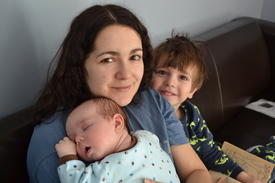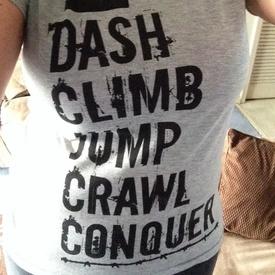are you on a specific diet or do you just do your own thing.
Replies
-
No specific diet for me, I just try to stay within my calorie requirements. I DO let myself have the things I love every day (i.e. chocolate) but in small portions.
Calorie counting seems to be working, though I am concious not to make it just about calories...Eating within the calorie limit but having most of it be junk doesn't make sense either!
I'm trying to change my habits slowly...drink more water (check), get more activity (check), increase veggies (check), start weights (check)...I'm just slowly adjusting my lifestyle based on what I observe by tracking everything, rather than following a specific plan or diet.0 -
2 things I follow: very low carbs for my PCOS and sugar free for my Type 2. Other than that I make my own up and have been super successful at it. Lost 45 lbs since March. Just hit my first plateau 2 weeks ago and changed up my calorie intake and have lost 4 more since then. I am now at the lowest I have been in 13 years!!0
-
I am definitely just doing my own thing...working very hard in the gym and really watching what I eat (with the help of MFP). So far, so good, and the cravings for bad food have dropped off almost completely.0
-
Like most everyone else, I just watch my calorie intake. With that being said, I do somewhat follow the foods listed in the South Beach Diet. In other words, I do try to avoid foods that are high on the glycemic index. That doesn't always happen, but I do want to keep my sugar in check. While I am not diabetic, it is in my family, so that is important.0
-
I have had really good success with specific diets in the past. The best ever was the 6 week body makeover - I didn't use any of the supplements or anything, just followed the food and exercise plan. The concern for me now is that I have 2 very thin little boys that I don't want to have thinking that they need to diet. I want to teach them how to control their limits and accept that there are foods that they can eat all the time, foods they should eat less frequently, and foods that are really not good for them at all, but that even those can be eaten very sparingly. I have to be the example to them, so no diet thing in the house.0
-
I'm on the 6 week body makeover plan. This plan seems to really work for me since I was able to tailor it specifically to me.0
-
i do my own thing....i eat healthy and in moderation...as far as junk ill eat alittle but i will exercise or substitue...i do keep my calories in check and i eat every 3 to 4 hours stopping my last meal around 6:30pm0
-
I don't follow any diet. I just try to eat healthy & incorporate a lot of veggies, fruits & lean meats. But i will still have my "treats" also.0
-
It depends on your particular metabolism, and it also depends on what *type* of foods you're eating. I have a metabolic disorder, can't process carbs, so my doctor instructed me to eat something with protein in it every three hours while I'm awake. That sustains my metabolism at a steady rate without spiking and crashing and without using carbs for energy. So I end up eating 6 small meals a day, sometimes 7 if I stay up late.I'm a 51-year-old RN with nearly 30 years experience. I know a thing or two about nutrition.
Should I eat 5-6 or even 7 small meals a day when losing weight to speed up my metabolism? Does it matter or can I eat just a few meals a day? Which is better for losing weight?
I have heard it both ways, I have heard eating small meals keeps your metabolism up but I have also heard it doesn't make a difference. I just eat when i get hungry, I end up eating 6 times a day, Breakfast,snack,lunch,snack,dinner,snack.
People's metabolisms can vary a LOT. That's why very different diets work for different people. You can get your doctor to do a test (like I did) to determine your particular metabolic needs, or you can just use trial and error to figure out how your body works best.
Good luck!0 -
I tried every diet under the sun for 20 years. And I've come to the conclusion that there's no such thing as a one-size-fits-all diet. Everyone is different, everyone's metabolism works a little differently, at different speeds, more or less efficiently...
If you study any biochemistry or anatomy, you see that our systems are incredibly complex. Tiny hormonal imbalances can have disastrous consequences, everything has to work together, everything interacts and affects everything else. Even the amount of sleep you get affects your ability to process foods & lose weight! A small percentage of people will be able to pick up "The South Beach Diet" or "The Primal Blueprint" and apply the principles "as is" and it will work for them. The rest of us need to adjust our lifestyles and eating habits for our own personal metabolisms & personalities.
With that said, personally I have had no success with the 'everything in moderation" rule. As some others have noted, that leaves way too much room for emotional eating and a lax interpretation of "moderation." I have to set strict rules for myself and follow them. Right now, I have two, both given to me by my doctor:
1. Eat no more than 25g carbs per day.
2. Eat at least 50g protein every three hours while I'm awake.
There are only two rules, and I can follow them any way I like (for example, any type of protein I want), but I do follow these rules strictly and never give myself a "day off" or cut myself any slack whatsoever. If I do that, I feel sick & miserable & remember why I started this in the first place. 0
0 -
I don't follow any diet. I just try to eat healthy & incorporate a lot of veggies, fruits & lean meats. But i will still have my "treats" also.
Same here. I also try to get three or four servings of calcium per day.0 -
I don't really follow a diet, I just try to eat healthy and stay a few 100 calories under my goal.0
-
I did the South Beach Diet twice but the first time the weight slowly crept back up and the second time it rapidly crept back up because I went from a mostly running routing for work to major surgery and I didn't keep up the eating habits and with not enough exercise I ballooned. It seems every carb I eat sticks with me. However I decided to count because I didn't want to limit myself and I think its time I really pay attention to what/how I'm eating.0
-
No diet here.. just living / maintaining a healthy lifestyle.0
-
I don't follow a diet, i just don't eat as much junk food and crap as I used to. And I like it....
 0
0 -
I'm a 51-year-old RN with nearly 30 years experience. I know a thing or two about nutrition.
Should I eat 5-6 or even 7 small meals a day when losing weight to speed up my metabolism? Does it matter or can I eat just a few meals a day? Which is better for losing weight?
There was a time that small, frequent meals was touted as having a metabolism-boosting effect, but the latest reports indicate there's no real research that has proven this theory. I personally do think you will be less susceptible to "binging" later in the day if you eat small, frequent meals.
The BEST way to boost your metabolism is to build muscle. This has been proven time and time again. You don't have to become "body builder buff" to enjoy the benefits of muscle-buidling exercises.
I also posted this article a while back - it DOES mention eating consistently throughout the day as one of the ways to boost metabolism:
From U.S. News and World Report: http://money.usnews.com/money/blogs/my-money/2010/08/16/17-ways-to-jumpstart-your-metabolism
17 Cheap Ways to Jumpstart Your Metabolism
Your metabolism – more specifically, your metabolic rate – is how quickly your body is burning calories. So if you’re trying to lose weight, raising your metabolic rate means you’ll see results faster.
You don't need fancy diets or expensive gym memberships to raise your metabolic rate. Here are 17 simple things you can do today to jumpstart your body.
1. Fidget. Tap your foot, twirl a pen, chew sugar-free gum while at your desk. Fidgeting uses energy, and while you won’t be shedding inches instantly, the mini-aerobics on a daily basis adds up – highly fidgety people may burn up to 500 calories more in a day.
2. Stay properly hydrated. Studies have shown that when we are dehydrated, our systems slow down. That includes our metabolism. Aim for at least 8 cups of water a day. An easy way to keep track is to get a 32-oz (4 cups) water bottle, and drink two full bottles a day. If water is too boring for you, there are several natural ways to make water more flavorful.
3. Avoid diet soda. Water is king when it comes to hydration, but many people find it boring and look for alternatives like diet soda. But just because it has 0 calories doesn’t mean it’s as good as water. The problem is that the chemical sweeteners used in diet sodas can increase food and fat cravings, which can make sticking to a structured diet and seeing results much harder.
4. Drink cold drinks. Research subjects’ metabolisms increased by a third in the 30-40 minutes after drinking a glass of water. The metabolic rate increase is due to your body warming up the liquid.
5. Spice up your meals. Spicy foods speed up the metabolic process by 20 percent or more for up to half an hour after eating them. Adding a dash of red pepper flakes to stews, pasta sauces, and other dishes is an easy way to turn up the heat and increase the burn.
6. Eat a balanced diet that includes “negative calorie” foods. Complex carbohydrates like whole grains, fruits, and vegetables fill you up and take effort for the body to break down. Some vegetables (like celery) and other complex carbohydrates (like high fiber foods) even require more calories to break them down than they contain, making them “negative calorie” foods.
7. Eat more protein. Studies have shown that the body uses twice the energy to break down foods containing protein as it does food that has a high carbohydrate or fat content.
8. Eat fish to store less fat. Eating salmon, tuna, and other fish lowers the levels of leptin in your body. Leptin tells your body how to store calories, and high levels of it trigger fat storage. Eat more fish, lower your leptin levels, and your metabolism triggers your body to store less fat.
9. Eat enough calories over the course of the day. Crash diets don’t work. If you take in fewer calories than your basal metabolic rate (BMR) – that is, the amount of calories your body needs when you’re completely inactive – then your metabolism will slow down as your body goes into survival mode. So make sure you eat enough to keep your metabolism from stalling.
10. Don't skip breakfast. Eating breakfast is a signal to your metabolism that it’s time to start working. Skipping breakfast for the sake of eating less throughout the day is counter-productive; not only does it keep your body in rest mode, but it also makes you hungrier throughout the day.
11. Eat consistently throughout the day. Eating introduces food into your system, which puts your metabolism to work converting that food to energy it can use. So constant snacking keeps your metabolism elevated throughout the day.
12. Plan ahead for meals and snacks. Eating smaller meals more frequently has the added benefit of keeping your energy level from spiking up or down, which helps you avoid hunger, stay more active, and avoid stress. Have a food plan for the whole day, so you’re not tempted by the vending machine in the afternoon and have the energy to exercise after work.
13. Kick your workouts up a notch. When you’re walking, wear a weight vest, or bring dumbbells and do curls along the way. Use fitness bands and other resistance gear to get your body to burn more energy in the same amount of time.
14. Focus on muscle at the gym. Building muscle will help you burn more calories even when you’re not moving. While cardio exercise helps to burn fat, muscle building speeds up your metabolic rate for up to 2 hours after every 20-minute session. Better still: every pound of muscle in the body burns 35 calories per day rather than the 2 calories burned by a pound of fat.
15. Perk yourself up with some caffeine. Whether it’s a cup of coffee in the morning or a cup of tea in the afternoon, a little bit of caffeine increases your metabolism in the short term. Just be aware that milk and sweeteners add calories, which can counter the metabolic benefits. Also beware of having too much caffeine, which may lead to energy crashes or fitful sleep.
16. Dodge stress. Stress raises cortisol levels; cortisol is a hormone that can make you hungrier and slow down your metabolism.
17. Never underestimate the value of a good night’s sleep. Like stress, though, lack of sleep can elevate levels of cortisol. If the risk of slowing your metabolism down isn’t enough to motivate you to try for 8 hours of sleep, how about this -- when you sleep, your body produces a hormone that increases your metabolic rate.
:drinker: :drinker: :drinker:
Ice0 -
My own thing is about getting in my essentials, drinking enough water, getting enough rest and exercise and eating within caloric limits. That's it. And it's worked for over 20 years.0
This discussion has been closed.
Categories
- All Categories
- 1.4M Health, Wellness and Goals
- 398.1K Introduce Yourself
- 44.7K Getting Started
- 261K Health and Weight Loss
- 176.4K Food and Nutrition
- 47.7K Recipes
- 233K Fitness and Exercise
- 462 Sleep, Mindfulness and Overall Wellness
- 6.5K Goal: Maintaining Weight
- 8.7K Goal: Gaining Weight and Body Building
- 153.5K Motivation and Support
- 8.4K Challenges
- 1.4K Debate Club
- 96.5K Chit-Chat
- 2.6K Fun and Games
- 4.8K MyFitnessPal Information
- 12 News and Announcements
- 21 MyFitnessPal Academy
- 1.5K Feature Suggestions and Ideas
- 3.2K MyFitnessPal Tech Support Questions















